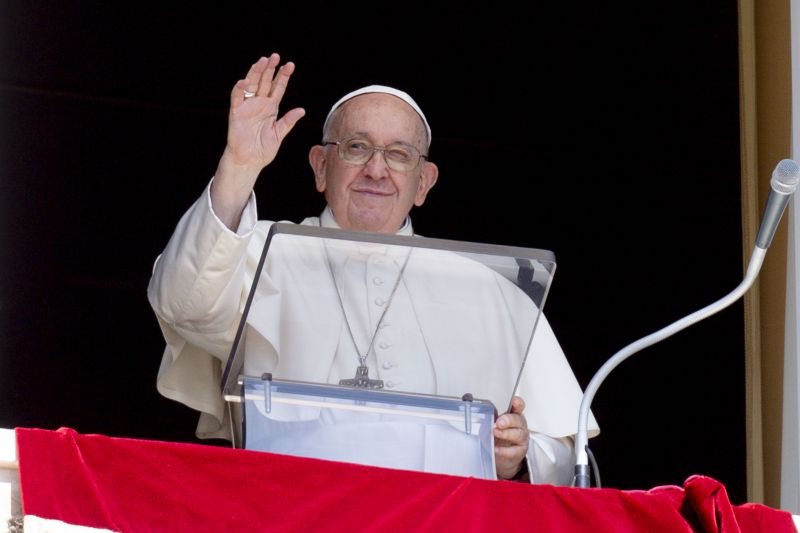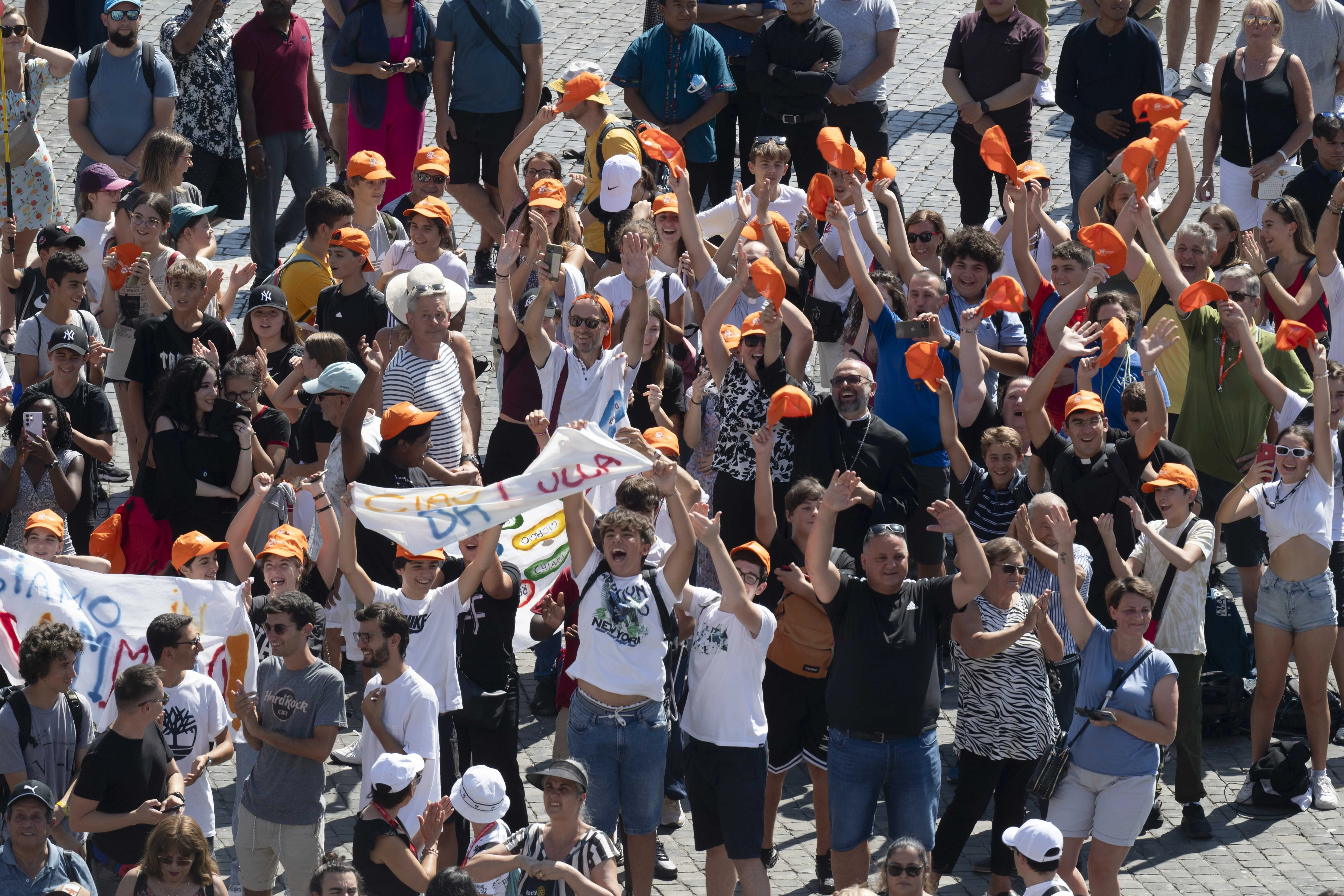
Rome Newsroom, Sep 10, 2023 / 07:05 am (CNA).
To dialogue with someone who has wronged us is a process that requires “real courage,” Pope Francis said Sunday, reflecting on the theme of “fraternal correction.”
In Sunday’s Gospel reading (Matthew 18:15-20) Jesus says: “If your brother sins against you, go and tell him his fault between you and him alone. If he listens to you, you have won over your brother.”
Fraternal correction is “one of the highest expressions of love, and also the most demanding, because it is not easy to correct others,” the Holy Father observed, speaking on Sept. 10 from a window at the Apostolic Palace to pilgrims gathered in St. Peter’s Square. “When a brother in the faith commits a fault against you, you, without rancor, help him, correct him: Help by correcting.”
The pope went on to condemn gossip, or “chattering,” which is “not right” and is “not pleasing to God.” He called gossip “a plague on the lives of people and communities because it brings division, it brings suffering, it brings scandal, and it never helps to improve, it never helps to grow.”
Fraternal correction, on the other hand, is a process that allows us to help the other person “understand where he is wrong. And do this for his good, overcoming shame and finding true courage, which is not to speak badly, but to say things to his face with meekness and kindness,” Pope Francis said. But he warned that “pointing the finger” at the other’s fault “is not good, in fact, it often makes it more difficult for those who made a mistake to recognize their mistake.”
“But we might ask, what if this is not enough? What if he does not understand?” the pope asked.
“Then we must look for help. Beware, though: not from the group that gossips! Jesus says: ‘Take one or two others along with you,’ meaning people who genuinely want to lend a hand to this misguided brother,” Francis urged.
“And if he still does not understand? Then, Jesus says, involve the community. But here, too, this does not mean to pillory a person, putting him to shame publicly, but rather to unite the efforts of everyone to help him change,” the pope said.
“And so, let us ask ourselves: How should I behave with a person who wrongs me? Do I keep it inside and accumulate resentment?” Pope Francis asked. “Do I talk about it behind their backs? ‘Do you know what he did?’ and so on. Or am I brave, courageous, and do I try to talk about it to him or her? Do I pray for him or her, ask for help to do good? And do our communities take care of those who fall so that they can get back up and start a new life? Do they point their fingers or open their arms?”
The pope asked again: “What do you do: Do you point the finger or open your arms?”

Following his reflection, the Holy Father expressed his “closeness to the dear people of Morocco” in the aftermath of a devastating 6.8 magnitude earthquake on the evening of Sept. 8 that has left more than 2,000 people dead and more than 2,000 injured as of Sept. 10.
Pope Francis also spoke briefly about the beatification of the Ulma family in Markowa, Poland. The Nazis brutally executed the devoutly Catholic family of Józef and Wiktoria Ulma and their seven children in 1944 for hiding eight Jews in their home outside the village of Markowa in southeast Poland. This is the first time an entire family has been beatified together.
The pope highlighted the family’s courage and evangelical love, for they “represent a ray of light in the darkness of the Second World War, be a model for all of us to imitate in our desire for good and in the service of those in need.“
Pope Francis used the example of the Ulma family to call for acts of charity to counter violence, as well as prayer; especially “for many countries that suffer from war; in a special way,” he said, “let us intensify our prayers for the tormented Ukraine.”
If you value the news and views Catholic World Report provides, please consider donating to support our efforts. Your contribution will help us continue to make CWR available to all readers worldwide for free, without a subscription. Thank you for your generosity!
Click here for more information on donating to CWR. Click here to sign up for our newsletter.





“…‘Take one or two others along with you,’ meaning people who genuinely want to lend a hand to this misguided brother.”
And then, respond in silence to the two or three, or even four, who submit the “dubia.” No need for “backwardist” gossipers! Move along folks, there’s nothing to see here.
“To dialogue with someone who has wronged us is a process that requires ‘real courage,’ Pope Francis said Sunday, reflecting on the theme of ‘fraternal correction’.”
And so now can Pope Francis (who really IS the Pope, btw) tell us why he refused to meet with the four ‘dubia’ Cardinals?
As usual Pope Francis counsels well, here the need for contained response during fraternal correction. A silencing of emotions for a good cause.
Silence can have different meaning depending on conditions. Dialogue or silent refusal. For Francis silence has seemed an oblique affirmation of what’s questioned. Dubia has become the byword for refusal to accept responsibility, although it implies indirect acknowledgment of the obvious. That what’s implied in Amoris Laetitia is true. Another instance is the silence over the pontiff’s knowledge of the McCarrick dossier and Archbishop Viganò’s allegation. Here silence implies guilt, although Francis’ response was indignation.
Now the question of his response to the Argentine bishops in their exchange of letters on interpretation of Amoris Laetitia. “That’s the only interpretation” responded Francis. Letters deposited in the Acta Apostolicae Sedis, sign of authentic magisterial doctrine. Consequently Argentine bishops conclude that His Holiness has changed Apostolic doctrine on adultery, a subject rightly addressed by editor Olson. There’s change in the practice of doctrine, but not in the formal pronouncement of doctrine. “That’s the only interpretation” is oblique, not definitively stated. It can have various interpretations.
Dr Fastiggi in Where Peter asserts the theological validity of the teaching on adultery in Amoris, based on conscience and mitigation. Although Fastiggi makes a presumption that the mitigating criteria are sufficient when such criteria cannot be proven. And if they were, the penitent would be eligible for a declaration of nullity, rather than receive the Holy Eucharist based on the presumption.
I’m afraid I’m a bit skeptical when I read Pope Francis’ advice to avoid rancor.
“Forgiveness is choosing to love. It is the first skill of self-giving love” – Mahatma Gandhi